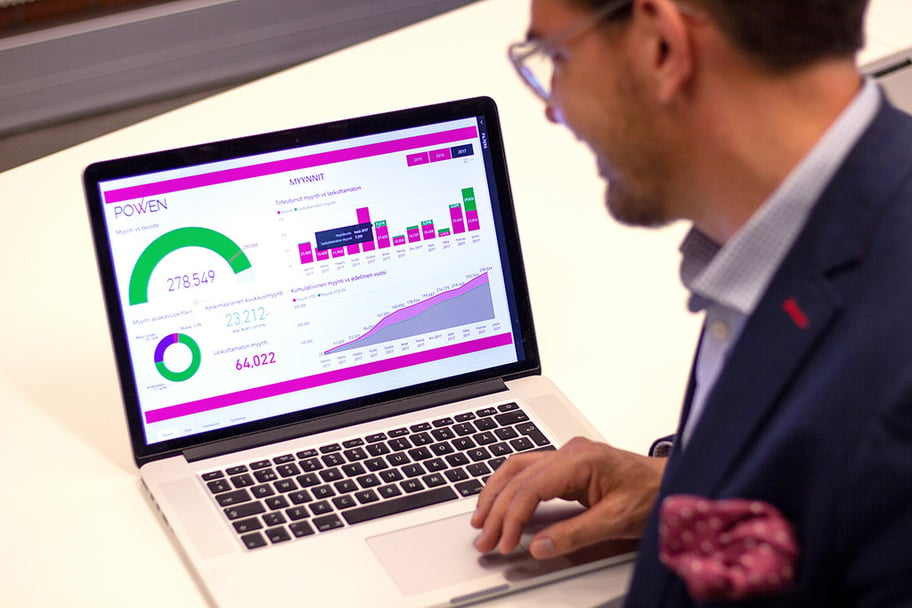 Ideally, Power BI guides the activities of the company and the entire personnel towards a more successful future. The vision is wonderful, but why does the system deployment still sometimes fail?
Ideally, Power BI guides the activities of the company and the entire personnel towards a more successful future. The vision is wonderful, but why does the system deployment still sometimes fail?
It is easy to see a lot of good things in the Power BI tool. Your company surely wants to produce modern, visual and real-time reports on its activities instead of obsolete Excel spreadsheets.
Ideally, Power BI guides the activities of the company and the entire personnel towards a more successful future. The vision is wonderful, but why does the system deployment still sometimes fail? Why do people stick to the old working procedures?
I can identify three main reasons linked together why putting Power BI into practice can fail.
- Hurry
- Motivation
- Fear
1. Hurry prevents the deployment
A lot of work is performed before the deployment of Power BI. Data from different source systems is collected, merged and modeled. Metrics and visual reports are created. When everything is technically ready, work is continued by putting the system into practice.
User training must not get trampled in the rush. Otherwise the well completed groundwork goes down the drain. Training that supports the deployment process should be well planned, and appropriate monitoring should be used to verify how the system is put into everyday practice. We must learn to ask for help. A well planned workshop day may be a sufficient start for taking Power BI into daily use. Learning then continues with the use.
People must learn to prioritize and reserve time on their calendars. The time sacrificed pays itself back many times week after week. This brings us to reason No. 2.
2. Motivation must involve the entire organization

With Power BI, employees can monitor the metrics that are essential for their own work.
Organizations often have one or more enthusiastic advocates of Power BI. The reporting solution is planned and implemented relying on their contribution. End user motivation should not be forgotten in company internal conversations.
All people do not become excited about technical novelties merely because of their newness. This should not be confused with resistance to change. Many people want concrete facts on how they can succeed better thanks to a new tool. In fact, this is one thing that should be understandably conveyed to the working community.
The introduction of Power BI is a major change and organizations must have appropriate skills for change management. When talking about knowledge management, it is not the mere use of the new tool that is concerned. A transfer from Excel to Power BI also always means a significant change in the company culture. Power BI is not a magic wand that suddenly transforms the company culture. It is, however, a part of the change and ideally supports it.
With Power BI, employees can monitor the metrics that are essential for their own work. If we say to a code creator that we need to increase revenue by 30%, this may seem a distant reality to them. If we say that we aim to perform customer work six hours a day, then the target becomes a tangible reality.
Any change resistance will fade out with the employee’s own insight.
Therefore, the metrics must be correctly selected for each employee. This can ensure that Power BI supports employees’ self-direction and motivation in their daily work.
3. I am afraid to know what data reveals about me
The third and the most difficult area consists of fear and uncertainty related to the introduction of a new system. Fear is the strongest and most primeval of human emotions. It has helped us survive when threatened by predators.
Power BI is not a beast. It is a mirror or a barometer. We may be afraid of the reflected image, but closing our eyes does not change it.
We may be afraid of what data reveals about us and our own working community. Are there things that I have not been able to take into account when reporting my own and my team’s performance? What will happen to me if the data shows that I have not achieved sufficiently good results?
In his book about leadership, Johtajuus – Kirkas suunta ja ihmisen voima, Matti Alahuhta discusses leniency towards oneself. What if we were not afraid of reflections but would rather concentrate on development?
Going in the right direction is more important than the present state with errors and defects. Data will help us go in a better direction, so it is worth embracing Power BI and make it your friend!

Petteri Väisänen
I lead Pinja’s BI unit, where we enable our clients to be truly data-driven. The most important thing about my job is the spirit and the work ethic of our team. I enjoy my free time with my family, where the spirit of doing is also very much present. In addition, boardsports and, actually, all sports are close to my heart.
Back to the Pinja Blog
Categories
- Career at Pinja (68)
- Manufacturing (46)
- Knowledge Management (45)
- Production Development (44)
- Software Partnership & Tools (42)
- Sustainability (37)
- Wood and Forestry (37)
- Bioenergy and Recycling (29)
- IT Support and Outsourcing (24)
- Ecommerce (23)
- Maintenance (22)
- Artificial Intelligence and Machine Learning (15)
- Public Services (9)
- Compliance (1)